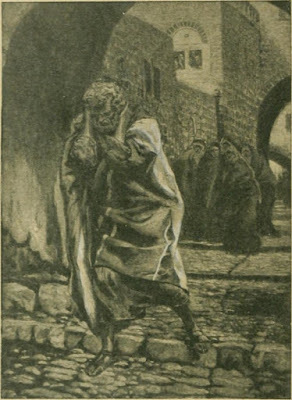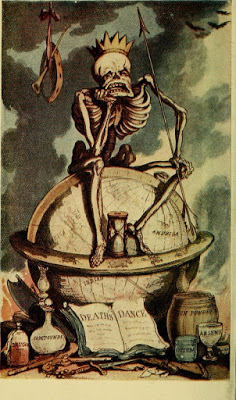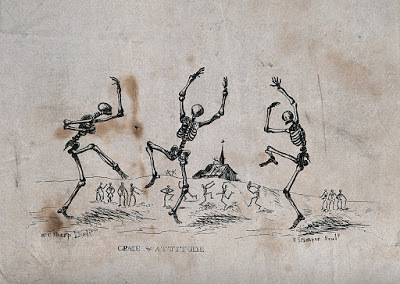Stephen Roney's Blog, page 243
April 21, 2020
News of the Apocalypse
NBC: Kim Jong Un is brain dead.
South Korea: NBC is brain dead.
We'll see who's right.
Perhaps they both are.
'Od's Blog: Catholic and Clear Grit comments on the passing parade.
Published on April 21, 2020 16:13
News of the Apocalypse
How about this one: did you hear how low the price of oil has gone? Oil is now free. Someone will now pay you for taking their oil.
'Od's Blog: Catholic and Clear Grit comments on the passing parade.
Published on April 21, 2020 13:38
The Original Locked Room Mystery

A Protestant friend recently argued with me against the doctrine of transubstantiation on these grounds: that Jesus, after the resurrection, proved he was not a spirit by having Thomas put his hands in the marks of the nails. It is in this Sunday’s gospel reading:
Jesus came, although the doors were locked,
and stood in their midst and said, “Peace be with you.”
Then he said to Thomas, “Put your finger here and see my hands,
and bring your hand and put it into my side,
and do not be unbelieving, but believe.”
A brief summary of the doctrine of transubstantiation is perhaps needed here: the Catholic Church holds that, at consecration, the bread and wine for communion actually transforms into the body and blood of Christ. They retain all the physical qualities of bread and wine, the “accidents.” But the substance has changed.
My Protestant friend is arguing that Jesus was here using the accidents to prove that he was in fact there in body, not just a hallucination. If God himself considers such visual and tactile evidence proof, it follows that anything that looks, smells and tastes like bread and wine, is actually bread and wine. No transubstantiation.
A clever argument; but it has things cleverly reversed.
In the gospel, Jesus is not showing the wounds in his hands and side to prove he has a physical body. To prove he were not a hallucination, touching him anywhere would have sufficed. But so would the simple fact that many disciples were seeing him at the same time. Touching his wounds proved something else. These wounds, after all, were fatal. He is proving he really did die. Yet he is here. He is proving that he has been able to overcome the characteristics, the accidents, of a physical body.
This body has also just passed through a wall into a locked room. The essence of the physical is that it occupies a discrete point in space; this body does not.
Later, when disciples encounter Jesus on the road to Emmaus, they do not recognize him. His body apparently lacks all the accidents that would identify it as him.
If Jesus’s resurrected body is capable of such things, it is surely as capable of appearing as bread or wine.
'Od's Blog: Catholic and Clear Grit comments on the passing parade.
Published on April 21, 2020 07:52
April 20, 2020
Salvation by Grace and Salvation by Works
 St. Peter denies he knows Jesus.
St. Peter denies he knows Jesus.With the pandemic, church services are being streamed live. That has its upside. This Sunday, I was able to virtually attend two I probably never would have gotten to if it had been in person, but two I was curious about: a small Pentecostal group, of which a friend’s nephew is pastor, and a Byzantine-rite Catholic mass.
They were more or less at opposite ends of the spectrum in terms of worship style. The Pentecostals very informal, just singing, praying together, and a sermon. The Byzantines all ritual; all sung and with lots of responsorials. The priest would stop the cantor if he was doing it wrong.
I loved them both. I am, at heart, a Charismatic Catholic. That’s combining the two.
But in terms of theology, I found the Pentecostal service lacking, even troubling. The message of the sermon was that God loves you, no matter when you have done. God does not care what you have done; his love is infinite and unconditional. “That was yesterday.” Repent, and all is forgotten.
That is a consoling message, no doubt, to those aware of grave sin. It is not so consoling to those who have been sinned against.
“Amazing Grace, how sweet the sound
That saved a wretch like me.
I once was lost, but now am found;
Was blind, but now I see.”
The legend goes that “Amazing Grace” was written by a former slave trader. Consoling, no doubt to him; but would it be equally consoling to the slaves?
Nor is it healthy for sinners. I can easily imagine an alcoholic hearing all this, that he is forgiven, and going out and having a drink to celebrate.
After all, it does not matter; he cannot justify himself by works. God loves him unconditionally. He will forgive him again tomorrow.
Nor does it match Jesus’s message. He is forgiving of the woman taken in adultery; he is not forgiving of the scribes and Pharisees. He is forgiving of Peter, who betrayed him three times. He is not forgiving of Judas, who betrayed him. He forgives the good thief on his right; he does not forgive the other thief on his left.
There is an obvious and dramatic distinction made in the New Testament, between forgiven and unforgiven, sheep and goats.
And being sorry is not enough. Judas is sorry.
“Then Judas, who betrayed him, when he saw that Jesus was condemned, felt remorse, and brought back the thirty pieces of silver to the chief priests and elders, saying, ‘I have sinned in that I betrayed innocent blood.’”
Part of the issue is indeed repentance; but just as a sin, to be mortal, must be grave, intentional, and fully understood, so a valid repentance must fully recognize and accept the gravity of the sin. It must be heartfelt. And such an acceptance of the gravity of the sin necessarily includes a sincere desire to make restitution, and accept just punishment, for the sin. It cannot involve any motive of getting away with anything.
This is a common misunderstanding of the Catholic sacrament of confession/reconciliation. No, you do not get off punishment once you have confessed your sin. That is why a penance is imposed. That is what purgatory is for. You preserve your salvation, but you do not escape punishment.
Jesus does not impose any further punishment on the woman taken in adultery; but we can probably assume she has already been sufficiently punished for the sin, without meriting death. She has already been publicly shamed, a public shaming that will follow her throughout life, which she will forever struggle to live down. He forgives the good thief—but the good thief is already undergoing extreme punishment for his sins, a punishment he explicitly admits he deserves.
He forgives Peter for denying him three times on the night he is crucified. He does not forgive Judas, and the Bible does not forgive him. But there is a relevant passage later in the Gospel of John. Jesus appears after the Resurrection, and speaks to Peter:
So when they had eaten their breakfast, Jesus said to Simon Peter, “Simon, son of Jonah, do you love me more than these?”
He said to him, “Yes, Lord; you know that I have affection for you.”
He said to him, “Feed my lambs.” He said to him again a second time, “Simon, son of Jonah, do you love me?”
He said to him, “Yes, Lord; you know that I have affection for you.”
He said to him, “Tend my sheep.” He said to him the third time, “Simon, son of Jonah, do you have affection for me?”
Peter was grieved because he asked him the third time, “Do you have affection for me?” He said to him, “Lord, you know everything. You know that I have affection for you.”
Jesus said to him, “Feed my sheep. Most certainly I tell you, when you were young, you dressed yourself and walked where you wanted to. But when you are old, you will stretch out your hands, and another will dress you and carry you where you don’t want to go.”
Why does he ask the same question three times?
Peter had denied knowing him three times.
Because he had denied him, now Jesus gives him the commission to witness to him three times, despite all dangers—clearly linking it to the earlier denial. This is Peter’s penance.
Salvation by grace alone subverts the Gospel.
'Od's Blog: Catholic and Clear Grit comments on the passing parade.
Published on April 20, 2020 06:03
April 19, 2020
A Journal of the Plague Year

It looks as though Scott Adams was speaking truth about virus cures; early reports have now emerged regarding the hydroxychloraquine trials, and they are not encouraging.
It may yet turn out to be effective, but if it were really effective, you would expect clearer preliminary results than this.
That leaves us in a hard place. Other treatments may prove effective, but anything else is going to take a lot more time. In the meantime, we cannot keep everything in lockdown.
Plan B would seem to be to test everyone, test often, and quarantine only those who have the virus; and those who most vulnerable to it.
We may also get some reprieve for the summer. Or the virus may still just burn itself out.
Things are getting rough in the Philippines. A neighbourhood near my family has been declared infected with the virus. Nobody is supposed to come or go. But someone from that neighbourhood slipped out and moved into a house on the next block.
The neighbourhood has arranged a bus for shopping; regular modes of transportation are banned. But proper social distancing seems impossible on the bus.
Several studies are emerging suggesting the infection rate is much higher than supposed. This also means the virus is less deadly than it seemed: most who get it show no symptoms.
The relative lack of spread in Japan, Hong Kong, Taiwan, Korea, looks interesting. I wonder if it has to do with the widespread tendency in these place to wear facemasks.
'Od's Blog: Catholic and Clear Grit comments on the passing parade.
Published on April 19, 2020 10:26
April 18, 2020
The Holy Squirrels of Mariposa

A band of squirrels had become quite a problem. The Presbyterian church called a meeting to decide what to do about the infestation. After much prayer and consideration, they concluded that the squirrels were predestined to be there, and they shouldn’t interfere with the divine will.
The Lutheran church nearby decided that they were not in a position to harm any of God's creatures. So, they humanely trapped their squirrels and set them free near the Baptist church.
At the Baptist church, the squirrels took an interest in the baptistery. The deacons met and decided to put a water-slide on the baptistery. The logic was that the squirrels would slide in and drown. The squirrels liked the slide and unfortunately, knew how to swim, so twice as many squirrels showed up the following week.
The Baptists took down the water slide, and the squirrels wandered over to the Anglican Church.
The Anglicans tried subtlety. They set out pans of whiskey around their church in an effort to kill the squirrels with alcohol. After all, it had worked with the Irish. They sadly learned how much damage a band of wet inebriated rodents can do. For some odd reason, however, the squirrels then decided they were Catholic.
But the Catholic priest came up with a very creative strategy. They baptized all the squirrels and catechized them. Now they only see them at Christmas and Easter.
--adapted by Stephen K. Roney from an anonymous joke sent by Violet Faust.'Od's Blog: Catholic and Clear Grit comments on the passing parade.
Published on April 18, 2020 07:38
Remembering Poetry

Nobody any longer understands poetry. Including most people who consider themselves poets.
This has to be considered odd, since until recently—perhaps 150 years ago—poetry was the most popular literary form.
Since this is National Poetry Month, my friend Xerxes did a column celebrating the poem as a form.
But he seemed to struggle to define it.
He suggested, first, that poetry is about metaphor.
Much poetry uses metaphor, it is true. But so does good prose; the genre that depends most fully on metaphor is myth or legend. And some poetry does not. It is considered bad form to use an obvious metaphor in, for example, a haiku. Or in some modern forms: as aggressively asserted in Gertrude Stein’s famous line, “A rose is a rose is a rose.”
He next suggests that poetry is about the expression of emotion; quoting Wordsworth’s line that it is “emotion recollected in tranquillity.” The full quote is:
“Poetry is the spontaneous overflow of powerful feelings: it takes its origin from emotion recollected in tranquillity.”
But that defines, not poetry, but Romantic writing. It would be equally true of Goethe’s The Sorrows of Young Werther. It is clearly untrue, on the other hand, of most poetry: of the great epics, the Iliad, the Odyssey, the Mahabharata, The Divine Comedy, The Canterbury Tales. Take only them, and emotional expression is a minority genre in terms of lines written. And this is not to mention Alexander Pope, or Robert W. Service, or Milton, or Rudyard Kipling, probably the four most popular and best-selling poets in the English language--or even the later Wordsworth.
Xerxes then posits—and this is his strongest point—that poetry seeks to say things “with an absolute minimum of words.” I have seen this said before; however, this defines not poetry, but modernist style. In modernist writing, it is equally true of prose: this is Strunk’s famous dictum, “omit needless words!”
None of these things are definitive of poetry: not economy of words, not metaphor, not vomiting up emotions on a page. What makes poetry a distinct form is its medium. And that medium is not the page.
Prose is the written word, preserved on a page.
Drama is the spoken word, seen live on a stage.
Poetry is the remembered word, kept always in the mind.
Poems really only work once memorized. This is exactly how and why a good poem will, in Xerxes’s own words, “dance a polka in your head.” It is experienced as uniquely alive.
This is the reason for rhythm and rhyme: they are mnemonic devices. They give you associations to help you memorize the poem. Contemporary poetry has been gravely crippled by their absence.
This is also the reason for much of poetic imagery; it is often useful as metaphor to convey some meaning, but whether or not it is metaphor, it creates visual associations, another mnemonic. Yeats sometimes made a point of writing poems connected only by images instead of rhyme. Lesser poets saw this, without seeing the art, and understood from this only that poems need not rhyme.
The current unpopularity of poetry, and the general inability to understand poetry, is directly due, I think, to a more general modern hostility to memorization.
Big mistake, for many reasons. That it killed poetry, the highest form of literature, is perhaps the least of it. We are all wandering aimlessly about with the bulk of our brains anesthetized.
'Od's Blog: Catholic and Clear Grit comments on the passing parade.
Published on April 18, 2020 06:45
April 17, 2020
Book Sale!

My contribution to helping you get through the general lockdown: I've taken 30% off the ebook price of Playing the Indian Card at Smashwords until the end of May.
Now's your chance to read it at a discount. Only $3.49 for hours and hours of eye-opening reading.
Everything you think you know about Canada's "First Nations" is wrong.
'Od's Blog: Catholic and Clear Grit comments on the passing parade.
Published on April 17, 2020 07:58
The Darkest Hour Is Just Before Dawn

Scott Adams, the genius behind Dilbert, has pretty much given up hope on hydroxychloraquine. We’re all going to get the virus, he figures, and all we can do is take our chances.
Adams is a very smart guy, who also hears behind the scenes, he says, from a lot of other people. He says there has been more than enough time for the results of the first proper controlled studies in the US to have become apparent. Studies still have to be written up, but if the hydroxychloraquine combination worked decisively, it would by now be apparent. So if we have not heard anything, it must be that it does not work.
Too bad, because up until a few days ago, Adams was quite hopeful about hydroxychloraquine, and was hinting at some very good news soon. Things he knew that the general public did not know yet.
I disagree with his current conclusion. I think Scott Adams is smart enough that he does not believe it either. I think if the studies so far had shown hydroxychloroquine did not work, we would also have likely heard by now. In fact, we would have been more likely to hear if it had not worked than if it had. We hear such things through the media, and the media have been out to discount it, to get at Trump, because he’s been speaking of it as promising. Any leak suggesting it did not work would therefore be prominently reported. Those involved in the studies would probably be approached by media, if they are doing their job, and coaxed to spill it if it did not work.
A leak suggesting it really did work would be much more likely to be buried. That would help Trump.
Even if it did work, and work well, there would be an incentive to bury this fact even for Trump and the administration.
Trump boasts that the US has 29 million doses of the hydroxychloroquine. No word on how much azithromycin. Twenty-nine million doses sounds like a lot. But according to the French study, five doses are needed to cure a typical case of coronavirus.
That’s enough to treat six million people, then. That still sounds like a lot.
But the word is that the treatment is only effective if given early, at the onset of symptoms. It cannot be held back for only the worst cases; to work, it must be given promptly to anyone with symptoms.
Now imagine it becomes publicly known that the hydroxychloroquine treatment is almost always effective, if given early.
There would be an immediate demand to end the lockdowns and get back to work. People are desperate. Even if the lockdowns were not immediately lifted, people would ignore them. Everyone would pour out onto the streets and form conga lines.
Experts estimate that, without the lockdown, 60% of the population will soon become infected. Roughly 200 million people in the US alone.
That means, in such a scenario, the US alone would need 200 million times five doses: a billion doses. Not 29 million.
And wait; there’s more. There are some reports that the drug is prophylactic. Take it regularly, and, as with malaria, you don’t get the illness, or the symptoms, in the first place. If that gets out, the demand will not be for five doses for 60% of the population, but five doses a month for 100% of the population, indefinitely.
In the meantime, you need to assure a secure supply for first-line medical workers, and for those already taking the drug for lupus and other ailments.
So if it works very well, there is a huge incentive to keep this quiet.
Notice that just about the same situation was behind the early assurances that masks were ineffective. Yes, they were always effective, but there were not enough of them, and they were needed for medical personnel.
But if hydroxychloroquine is effective, and this is now well-established, it explains why Trump feels it is now possible to start cautiously opening things up. Cautiously, and without revealing how effective the treatment is, so that numbers infected do not outstrip supplies.
I suspect that Adams, if he indeed has lots of contacts, has been gotten to and had this explained to him. He has been asked to dampen expectations so that it all works.
Trudeau had just announced that Canada would need to remain in lockdown until late summer, and Duterte in the Philippines just said the same. This, presumably, is the difference between knowing about and having hydroxychloroquine, and not having it. Without it, this is what the medical models suggest is necessary.
I expect that, behind the scenes, the US is doing what is necessary to increase their supply. Whether that includes invading Venezuela or not.
At the same time, there are early promising reports about another drug, remdesivir. The stock market was up yesterday on the news. This one was leaked. Remdesivir is a lot more expensive than hydroxychloroquine, but it seems to be effective with the most extreme cases, exactly those with which hydroxychloroquine is reportedly ineffective. For this reason, it can be safely announced even if available only in small quantities.
The two together might cover the zone.
'Od's Blog: Catholic and Clear Grit comments on the passing parade.
Published on April 17, 2020 07:44
April 16, 2020
A Journal of the Plague Year

Out and about today because I needed to mail a couple of letters—one to the government with a time limit on it. I also needed change for laundry. Not being out and about, I have not accumulated any. In ordinary times, I could, in a pinch, have used a change machine at the laundromat across the street. But it is closed due to the virus.
There was not much foot traffic in my neighbourhood, but cars seemed to circulate at the usual level. There was a lineup at the supermarket, but not long.
The post office was not open yet. They were delaying opening by an hour due to coronavirus.
The day was sunny and cold. Daffodils and dandelions were in bloom. Saw one of our black squirrels, apparently not common in other parts of North America, and a big fat robin. Spring is here.
Back out an hour later to try again. Got the letters sent, but could not get change for laundry. The postal clerk said they could not get change for their float, because the bank is closed.
Banks closed? This seems to me sure to become a grave problem—businesses cannot get change for their floats? Shouldn’t banks be an essential service? Apart from practical matters, it seems to me important psychologically for banks to be open. It is unsettling if money is suddenly not available; shades of bank runs.
Trudeau yesterday said Canada must remain in lockdown for some time to come. Last week he said the restrictions would apply until sometime in the summer.
I think he is foolish to say this, and it is not going to happen.
You can see a lot of restlessness already in the US. The mood seems to be shifting quickly towards getting back to work. With or without an effective treatment, with or without widespread testing, I hear suggestions that the virus follows a natural curve, a surge and then abatement, and in most places we are on the downward slope of that surge. People are saying the shutdown was an overreaction.
That may not be objectively true, but it looks as though US governments cannot keep a lid on things much longer, and it looks as though they have no intention to do so. A consortium of states in the Northeast have declared their intent to reopen; a consortium of states in the West have done the same; and Trump says the feds will have a plan soon.
If the US starts reopening, there is no way Trudeau can keep Canada closed. He now risks being blamed for a panicked overreaction, or a grab for power.
Aside from this, it is bad psychology to say in advance that you plan to keep things closed for much longer. First of all, you do not really know if this is necessary; we are learning as we go. Secondly, you need to give people hope that things could get better soon. Hope is important.
I think the truth is that Trudeau is panicked. I think he has shown a tendency to panic before this. We are unlucky he is PM at such a time.
Some premiers are doing a far better job: Legault in Quebec, Ford in Ontario, Kenney in Alberta. They are essentially working around Trudeau, and Kenney is pretty open about it.
It is a pity none of them are running for the vacant Tory leadership. Kenney in particular.
I predict things are going to open up soon, in the US and around the world. I think the worst is over.
'Od's Blog: Catholic and Clear Grit comments on the passing parade.
Published on April 16, 2020 09:11



